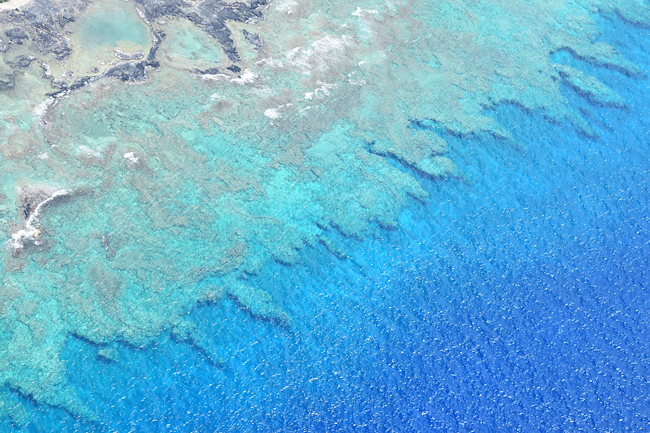Danial Norjidi
A new study has found that most of the Commonwealth’s coastal and island states have mainstreamed ocean-based actions and commitments in their most recent Nationally Determined Contribution (NDC) reports.
Titled “Blueing the NDCs: A Review of the Nationally Determined Contributions of Commonwealth Coastal and Island Countries for Ocean-Based Actions and Commitments”, the study of 49 Commonwealth countries that border the sea (out of 56) was commissioned by the Commonwealth Secretariat.
As a Commonwealth press statement explained, the study aimed to determine how ocean activity had been integrated into those 49 member states’ NDCs, which are the five-yearly reports that capture a nation’s climate ambitions under the Paris Agreement.
“NDC reports are the main mechanism by which countries communicate their ambitions and efforts in support of the Paris Agreement,” according to the study.
The global community reconvened in Egypt to measure progress, the study asks the question: “How prominently do vital ocean-based commitments and actions figure in this process?” during the 27th Conference of the Parties (COP27) to the United Nations Framework Convention on Climate Change (UNFCCC) in November 2022.
“Focussing on the ocean-climate nexus is a key part of tackling the climate crisis, including limiting global temperature rise above pre-industrial levels to well below two degrees Celsius and pursuing efforts to hold such an increase to 1.5 degrees Celsius.

“The preambular paragraph to the 2018 Commonwealth Blue Charter, adopted by Commonwealth countries, highlights that the ocean produces half of the world’s oxygen, absorbs approximately one-quarter of our carbon dioxide emissions, and absorbs most of the world’s extra heat.”
The report is described as examining five key themes that are critical to the ocean-climate nexus: restoring, conserving and financing critical coastal vegetation, including mangroves, saltmarshes, seagrasses and other blue carbon sinks; protecting critical habitats and ecosystems to increase resilience to climate impacts; supporting emissions reduction in maritime shipping (‘green shipping’); building coastal resilience, including that of communities, cities and infrastructure; and transitioning to ocean-based renewable energy.
The report’s review of the Commonwealth’s 49 coastal and island states’ (the ‘Commonwealth Ocean’) NDCs produced various overall findings, one of which is that more than 75 per cent of Commonwealth small island developing states (SIDS) have led the mainstreaming of ocean-based actions and commitments in their NDCs.
The study also found that 59 per cent of all Commonwealth Ocean countries have mainstreamed ocean-based actions and commitments in their most recent NDCs.
Another finding was that just one-third of developed countries in the Commonwealth had mainstreamed ocean-based actions
and commitments.
However, the study added that some countries have publicly announced greater ambitions concerning the ocean-climate nexus, with associated plans and actions not captured in their most recent NDCs.
“This is a missed opportunity: codifying these ambitions in NDCs may help to mobilise resources to aid in their delivery, as well as provide an important accountability mechanism,” the report added.
Among the study’s key takeaways was that the percentage of countries mainstreaming ocean-based actions and commitments in their NDCs across the five regions of the Commonwealth was generally the same, except for Europe.
“This mirrors the picture across the pan-Commonwealth, with 62 and 64 per cent of regions – compared to 59 per cent of Commonwealth coastal and island countries – mainstreaming ocean-based actions and commitments in their NDCs.
“The low figures for the European region may be partial because two of the three Commonwealth countries reviewed (Cyprus and Malta) did not have their bespoke NDCs, but were included in the submission by the EU.”
The report also noted regional variations under the five key ocean-based themes considered.
Most Commonwealth countries disclosed information around the climate-critical habitats and ecosystems theme, while ocean-based energies were the least disclosed theme.
It was shared that the interface between marine transport and climate was not disclosed as much as other themes, apart from the Pacific region.
Another key takeaway was that reporting portrays information at a static time. “However, effective mainstreaming extends beyond integrating ocean-based actions and commitments into NDC reporting. It should also be embedded in developing, revising and enhancing climate ambitions and the underlying plans to achieve them, and governance structures for monitoring progress in this area.”
In the Commonwealth press statement, Blue Charter Adviser at the Commonwealth Secretariat Heidi Prislan said, “It is very encouraging to see that the ocean’s role in tackling climate change is increasingly recognised. However, there is more to be done. While three out of five countries have mainstreamed ocean action into national climate ambitions, it also means two out of five have not.”
Meanwhile, Head of Oceans and Natural Resources at the Commonwealth Dr Nick Hardman-Mountford said, “We hope this paper will help raise awareness about the suite of opportunities at the ocean-climate nexus which could be accelerated. In particular, updating or revising future NDCs with more blue actions could reap more benefits for member states.”





